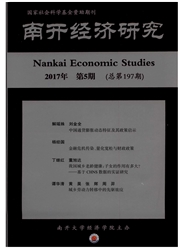

 中文摘要:
中文摘要:
为了从理论和实证上分析“企业污染减排激励为什么缺乏”这一问题,本文在一个双重任务的共同代理框架下,研究了企业污染减排的激励机制和制度环境,并收集了2001--2007年二氧化硫排放量的省际面板数据,对理论模型进行实证检验。理论模型表明,在污染减排与短期经济行为之间,存在投入成本替代的情形,经济产出带给地方政府的边际收益上升会弱化企业的减排激励;此外,来自各级政府的共同代理问题,也会损害企业的减排激励。实证结果表明,地方政府短期利益导向的行政干预越多,地区人均财政赤字水平越高,地方政府引进的外商直接投资越多,地区工业增长越快,经济产出带给地方政府的边际收益就越大,该地区企业的二氧化硫排放量就越难以控制;此外,地方政府规模越大,该辖区内企业所面临的委托人就越多,来自各级政府的共同代理问题就越严重,该地区企业的二氧化硫排放量也就越大,从而实证结果支持了本文的理论模型。
 英文摘要:
英文摘要:
This paper firstly proposes a principal-agent model with dual tasks and common agency to analyse the incentive mechanism and institutional environment of industrial pollution emission incentives and institutional environment. We prove that when the risk between shortterm behavior and emission reduction behavior is positively correlated and the costs between short-term behavior and emission reduction are substitute,a increase of marginal income which short-term behavior brings to local government will weaken the companies' emission reduction incentive. Then ,we use the panel data on local the Provincial Panel Data of Industrial Emissions of SO2 to investigate the relationship among local government intervention,local government size and Industrial Emissions of SO2.We find that local government intervention and local government size have negative influence on industrial emissions of SO2.
 同期刊论文项目
同期刊论文项目
 同项目期刊论文
同项目期刊论文
 期刊信息
期刊信息
